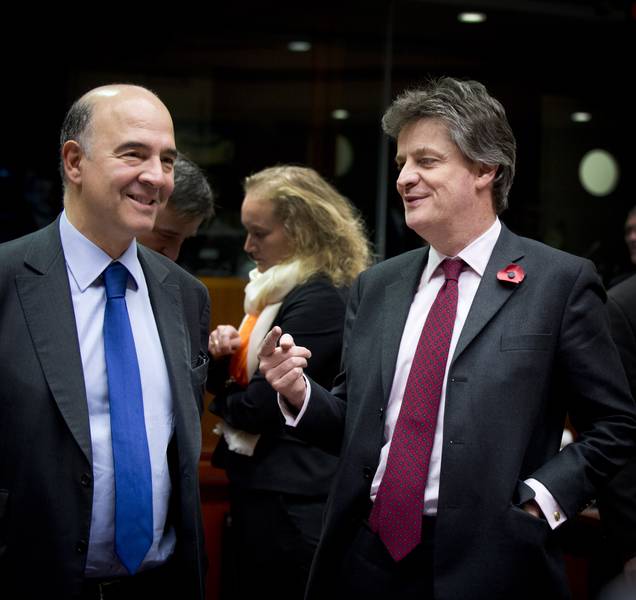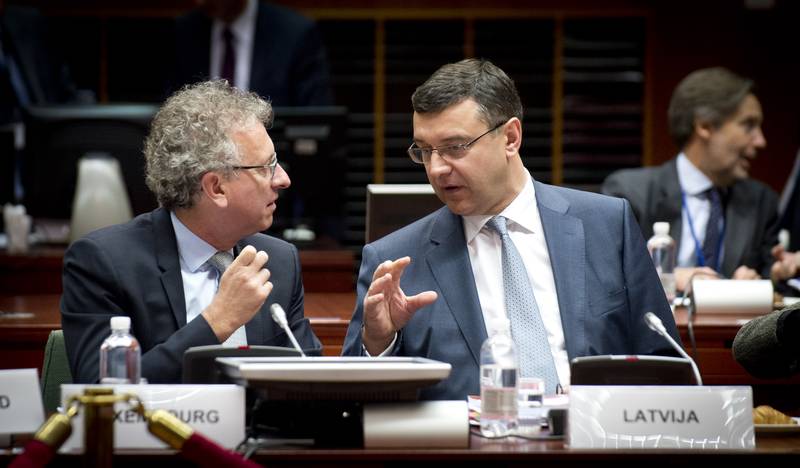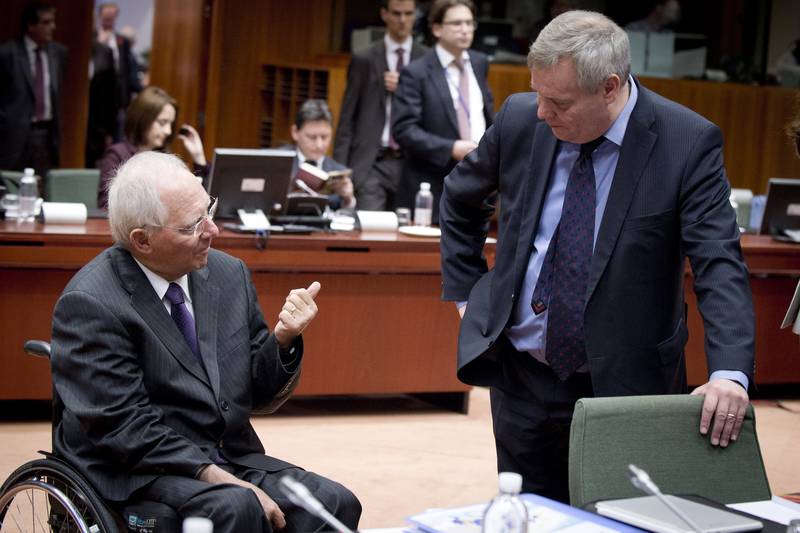Wolfgang Schäuble: Not Adopting the FTT Endangers the European Democracy
Adelina Marini, November 13, 2014
 The Financial Transaction Tax (FTT) ensures that we have learnt the lessons from the banking crisis. Unless we accelerate the work on improving the rules so that they are adequate to an environment of globalisation, we will destroy the support for the European integration and that will be the end of our democracy. This message was conveyed on Friday (Nov. 7) by Wolfgang Schäuble, the German finance minister, during a public debate on the enhanced cooperation procedure for the introduction of FTT for 11 EU member states. The debate took place during the regular meeting of the EU finance and economy ministers. The FTT saga has been spinning for 3 years now, ever since the idea of a such a tax was for the first time introduced in response to the global financial and the subsequent severe economic crisis. Then, however, it was not welcomed by all the member states.
The Financial Transaction Tax (FTT) ensures that we have learnt the lessons from the banking crisis. Unless we accelerate the work on improving the rules so that they are adequate to an environment of globalisation, we will destroy the support for the European integration and that will be the end of our democracy. This message was conveyed on Friday (Nov. 7) by Wolfgang Schäuble, the German finance minister, during a public debate on the enhanced cooperation procedure for the introduction of FTT for 11 EU member states. The debate took place during the regular meeting of the EU finance and economy ministers. The FTT saga has been spinning for 3 years now, ever since the idea of a such a tax was for the first time introduced in response to the global financial and the subsequent severe economic crisis. Then, however, it was not welcomed by all the member states.
In the summer of 2012, a consensus was achieved that unanimity by the then 27 member states was impossible and 11 of them wrote to the European Commission asking to use the right in the Treaty for an enhanced cooperation on the basis of the Commission's 2011 proposal. After continuous debates, the Council of ministers of finance and economy (ECOFIN) also gave its consent the FTT to be introduced by 11 member states only. In February 2013, the Commission proposed a revised draft of its initial proposal, accommodated to the more specific new situation. The main elements of the old proposal are maitained, which are to tax financial transactions with 0.1% for shares and bonds and with 0.01% for derivatives. Initially, on the basis of a proposal for the 27 member states, the Commission expected the FTT revenues to amount to 57 billion euros annually. Because of the downsized geographical scope, though, it revised its expectations to between 30 and 35 billion euros of revenues.
The Commission's old proposal envisaged for the collection of the tax to be applied the residence principle, which means the tax to be owed if a party in the transaction resides in a participant member state no matter where the transaction takes place. What is new in the second proposal is that the additional "safeguard" measure aimed at preventing avoidance of the tax by introducing the issuance principle. This principle envisages to tax financial instruments issued by the 11 participant countries during trade even if those who trade them are not established in the FTT zone. This, however, was one of the controversial points during the debate on 7 November in the ECOFIN. Morten Ostergaard, the Danish economy minister, recalled the opinion of the Council's legal service that the residence principle is not compatible with the European legislation, which is why the future FTT should rest on a solid foundation. That is to apply the issuance principle.
Jeroen Dijsselbloem, the Dutch finance minister and Eurogroup chief, supported Denmark and called on the Commission to seriously consider how exactly the enhanced cooperation procedure will affect the entire Community. Luxembourg, too, is of the opinion that the FTT will have severe consequences for the non-participating countries. Pierre Gramegna, minister of finance, said that Luxembourg prefers the criterion "issuance" to "residence", but requested more information because he was not sure whether everyone understood well the new mechanism. The German finance minster, Wolfgang Schäuble, however, attacked Luxembourg by reminding that currently there are serious media storms because of his country. It is necessary to achieve progress in the cooperation and the regulation of financial issues, but taxation as well, he underscored.
 The hostility between Germany and Luxembourg, specifically when it comes to taxation matters, is not new. Currently, Luxembourg is under fire because of uncompetitive taxation practises. The global network of investigative journalism has recently published documents that show that big international companies, like Pepsi, IKEA, FedEx and others (340 companies) used secret deals that allowed them to avoid the high global taxes without, however, having strong presence in the duchy. The affair, that has become known as Luxembourg Leaks, reveals that billions of dollars were channelled through Luxembourg and were taxed by a minimal tax. EU and Luxembourg have been for months locked in a battle over the duchy's reluctance to provide information about its taxation practises to the EU. This puts the new European Commission chief, Jean-Claude Juncker, into a very difficult situation because he was the longest serving prime minister in the EU (of Luxembourg) and before that he was a minister of finance of that country. This makes it highly unlikely that he did not know about these practises and in his new capacity it seems he will investigate his own self.
The hostility between Germany and Luxembourg, specifically when it comes to taxation matters, is not new. Currently, Luxembourg is under fire because of uncompetitive taxation practises. The global network of investigative journalism has recently published documents that show that big international companies, like Pepsi, IKEA, FedEx and others (340 companies) used secret deals that allowed them to avoid the high global taxes without, however, having strong presence in the duchy. The affair, that has become known as Luxembourg Leaks, reveals that billions of dollars were channelled through Luxembourg and were taxed by a minimal tax. EU and Luxembourg have been for months locked in a battle over the duchy's reluctance to provide information about its taxation practises to the EU. This puts the new European Commission chief, Jean-Claude Juncker, into a very difficult situation because he was the longest serving prime minister in the EU (of Luxembourg) and before that he was a minister of finance of that country. This makes it highly unlikely that he did not know about these practises and in his new capacity it seems he will investigate his own self.
The Irish Minister of Finance Michael Noonan did not take a firm position but said that the enhanced cooperation procedure is rarely used. Moreover, it will be for the first time applied in taxation matters. He urged the Commission to ensure that nothing will cause a precedent that could have an impact on other taxation areas. Ireland is especially afraid of a renewal of the debate on harmonisation of the corporate tax basis. Dublin was subjected to strong pressure to increase its corporate tax because it was undercutting the market. The strongest pressure came from Germany and France. Currently, a commissioner for economic and financial affairs is the former minister of finance of France Pierre Moscovici, who said during the debate that the FTT is a very important project politically that would move the tax harmonisation issue forward as it is a major priority for the new Commission.
Hans Jörg Schelling, Austria's finance minister, said that there will be no consequences for the other countries. The solution is simple, he said and urged a decision to be taken by the end of the year because, otherwise, it will be impossible the FTT to be introduced as of 1 January 2016 as is the deadline. Mr Moscovici believes, though, that there is a chance everything to end in time. There was disagreement on the taxation principle among the participating countries as well. Some of them prefer the approach of the Commission as laid out in its proposal to apply the residence principle, supplemented by the issuance principle as a last resort. They believe this principle is fairer in terms of the effects from revenues because it will not be disadvantageous to the countries with less issuers.
Others are of the opinion that it is better to apply the issuance principle because taxation will happen depending on the place of establishment of the issuer. This will ensure more effective taxation and easier collection. In October, the Italian Presidency proposed three compromises. Two of them supplement the issuance principle with elements from the residence principle, whereas the third combines the issuance principle with an economic element like, for instance, GNI, population or else that could serve as a basis for the distribution of the revenues among the 11 participant countries. During the public debate none of them commented on this particular issue but the press release after the meeting says that no agreement has been reached.
Unclear remains another issue as well. The participant countries have reached an agreement in terms of FTT taxation of shares and bonds but there are still technical disagreements in terms of taxing derivatives. Under the enhanced cooperation procedure, all EU finance ministers can participate in the discussions but only the ministers of the 11 participant countries can vote. Those are Austria, Belgium, Estonia, France, Germany, Greece, Italy, Portugal, Slovakia, Spain. In 2011, when the Commission  proposed the FTT, Bulgaria was against. In the governance programme of the new government, however, it is envisaged to introduce a tax on the operations on capital markets.
proposed the FTT, Bulgaria was against. In the governance programme of the new government, however, it is envisaged to introduce a tax on the operations on capital markets.
According to the joint declaration of the participant countries from May this year, the tax will be applied progressively, initially only on shares and derivatives. If a member state would like to broaden the scope of the tax, the rest would not object. The tax will not affect the daily financial activities of the citizens and businesses, i.e. loans, payments, insurances and deposits nor would it affect the traditional investment activities of banks. From the tax are also exempted the transactions between the central banks and the ECB as well as the operations related to the European Financial Stability Facility (EFSF) and the European Stability Mechanism (ESM) - the temporary and the permanent bailout funds of the euro area.
 Klaus Regling | © Council of the EU
Klaus Regling | © Council of the EU Mario Centeno | © Council of the EU
Mario Centeno | © Council of the EU Mario Centeno | © Council of the EU
Mario Centeno | © Council of the EU